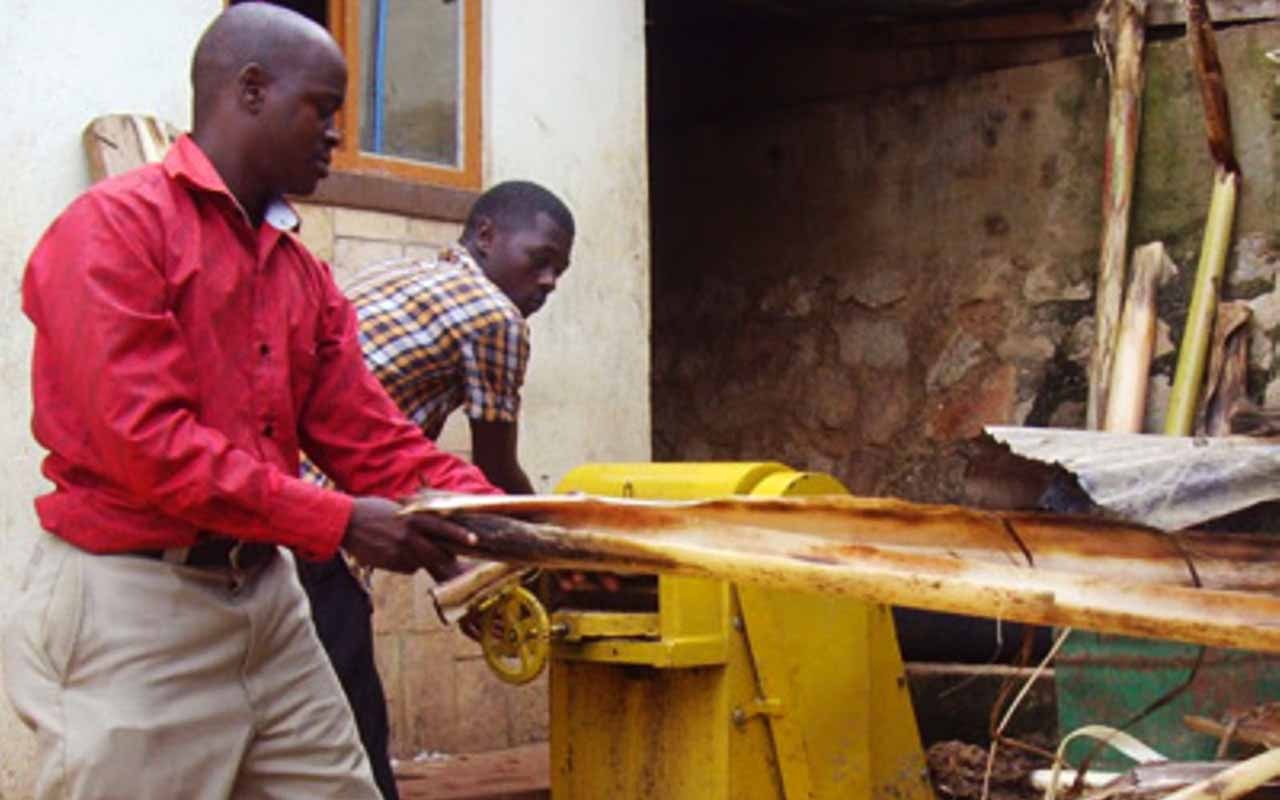Prime
How you can make a fortune from banana fibre

Godfrey Atuhaire demonstrates how to fix the banana fibre in a crushing machine. Photo/File
What you need to know:
- Apart from receiving multiple honours such as the Presidential Innovation 2023, CITI and the Circular Economy Awards, Sikulu participated in the six-month O-farms E4Impact accelerator programme on business training and agri-circularity.
Banana is one of the staples in many homesteads, particularly in the central and western regions of the country.
While most families grow bananas for consumption and sale, a young entrepreneur is making the most out of the stems by turning them into packaging bags.
Rose Sikulu says her main goal is to eradicate the menace of single-use plastic bags.
She believes it will also help fight deforestation as the raw material for paper is trees. As a child, the now 26-year-old witnessed the large-scale felling of trees for Pan-African Paper Mills.
Inspiration
Sikulu studied Industrial Chemistry at Kenyatta University to find a substitute for paper made from trees. With some savings and business expertise that included running the family’s poultry venture from the time she was in primary school, Sikulu founded FiberText Green Paper Ltd in 2017.
The B2B firm specialises in upcycling banana waste into organic fertiliser and biodegradable packaging. “We divert banana biomass waste from landfills, reduce environmental pollution caused by rotting biomass and promote sustainable packaging,” she tells Seeds of Gold.
“We also create a closed-loop system by sourcing raw materials from farmers, empowering the community economically and providing biodegradable products that contribute to waste reduction and ecological balance.”
From banana to paper
Fibre is extracted from the banana stems by removing the soft part, as the inner fiber is what is used for making paper.
Godfrey Atuheire who adds value to the fibre says he uses a machine called the extractor for this purpose. He acquired it at Shs3m ($1,000) from UIRI.
The extracted fiber is thereafter washed, cut into small pieces and cooked for three hours in pots and later cooled.
It is this cooked material that is mixed with water and put into the pulping machine that beats and crushes the solution into pulp, a porridge like mixture.
Starch is usually added to create a paper product that will not be prone to water penetration and in case the desired paper is to be coloured, the intended colour is added at this stage.
Market
To guarantee a consistent supply, Sikulu talks to more families to grow bananas.
Once the stems arrive, they are measured for height. Fibre from the pseudo stems is extracted, boiled, cleaned and blended.
The pulp is collected using nets. It is then sundried for six hours, turning into paper.
The paper is then cut, folded, and branded according to a customer’s request.
“We sell the bags to businesses in all the major towns. I have directly employed seven workers and more than 100 indirectly. More are being trained,” Sikulu says.
“We target ecologically concerned eateries, boutiques and beauty parlours.”
These businesses are likely to have large margins and steady revenue.
Shops that focus on middle and upper class customers are the target of the FiberText.
Prices
A FiberText’s unbranded A3 bag costs Shs3,600, branded with logo goes for Shs4,200, customised with the client’s logo Shs4,500, while an A4 unbranded bag retails for Shs2,000.
She says the items produced by FiberText are sturdy, high-quality, biodegradable, chemical-free and resistant to UV rays.
Sikulu utilises social media to promote her products and takes advantage of networking programmes and exhibitions to reach customers.
Challenges
Though her major challenge has been acquiring machines, Sikulu is happy to have created jobs for many locals.
“Seeing farmers make additional cash motivates me. We hope to lead the way in environmentally friendly packaging in the near future,” she says.
“The company’s competitive advantages include aesthetically pleasing products, proximity to raw materials and inexpensive labour.”
The packaging sold to food vendors is heat-resistant. FiberText serves at least 300 companies and individuals.
The company’s small size and lean team enable flexibility in decision-making, providing consumers with agility, reactivity and speedy turnaround times.
Apart from receiving multiple honours such as the Presidential Innovation 2023, CITI and the Circular Economy Awards, Sikulu participated in the six-month O-farms E4Impact accelerator programme on business training and agri-circularity.




